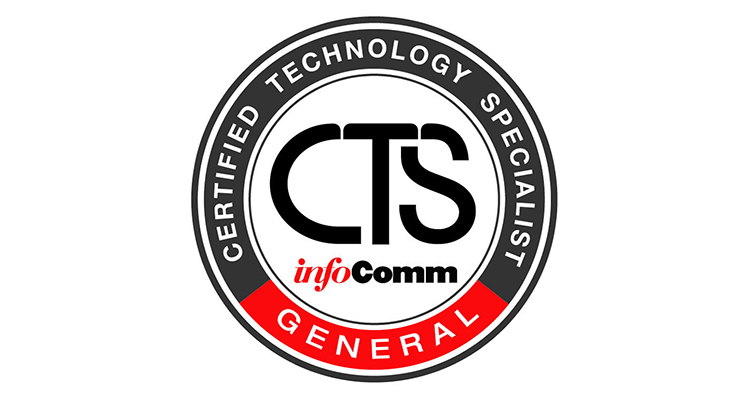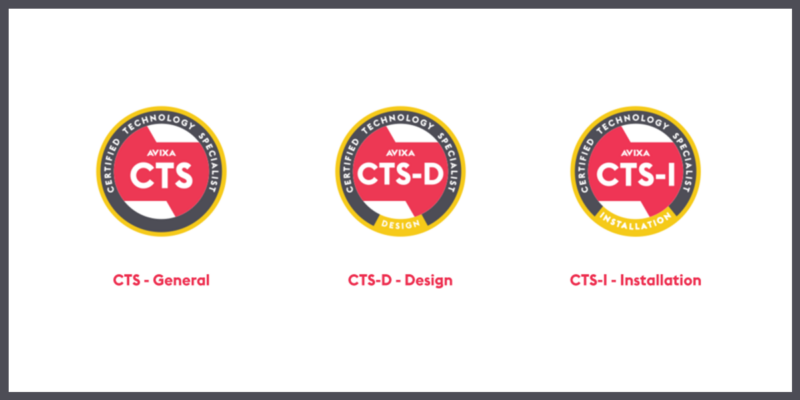In Defense of the CTS Program
 There’s been some chatter around here lately on the CTS certification. Mark Coxon used his skepticism on renewal rates as a vehicle to question the value of the certification. Gary Kayye told us what CTS means to him. This lead me to contemplate what I thought of the certification, about renewal, and about where we as an industry go from here. If you’re not tired of this topic already, read on!
There’s been some chatter around here lately on the CTS certification. Mark Coxon used his skepticism on renewal rates as a vehicle to question the value of the certification. Gary Kayye told us what CTS means to him. This lead me to contemplate what I thought of the certification, about renewal, and about where we as an industry go from here. If you’re not tired of this topic already, read on!
How Do I See CTS
I earned my CTS quite a few years ago while working for an AV integrator, and added the -D nearly three years ago after joining the consulting side of the business. I’ve spoken of CTS-noletter as confirmation that one knows the language; when I took it the questions were about analog video formats (composite, component, the long-forgotten S-Video), balanced and unbalanced audio and basic project-management concepts (e.g., when submittals are delivered, what’s in a site-survey report). If somebody — be they an end-user, an entry-level technician, or a manufacturer’s rep — holds a CTS that tells me that they speak the language. Today I’d expect them to know what EDID is, what HDCP is, what the varying flavors of streaming encoding are. I’d expect them to know the frequency range for human hearing. This doesn’t mean that they can necessarily DO all that much, but it has great value in confirming that we all speak a common language and that they can engage in a conversation about AV technology without getting lost. As a consultant, I want contractors bidding on projects with which I am associated to have at the very least this level of competency; a contractor’s percent of CTS holders is an objective metric by which they say that they will send individuals to a meeting or a job site who won’t embarrass themselves and their firm by not understanding the language. It’s imperative to have, and does the industry good.
It also does the individual good in that they can market themselves to a contractor or the AV department with an end-user as someone with, at the very least, a confirmed level of basic comprehension of industry terms. The letters “CTS” after your name serve as shorthand for general knowledge of AV concepts and, most importantly, language.
CTS-I and CTS-D are a different animal; in addition to the test, there is a requirement that one has spent at least five years in an installation or design role, respectively. My favorite cross-industry analogy for this is the Project Management Institute’s PMP (Project Management Professional) certification. Each requires a verified number of years experience in the role in question in addition to an exam. In neither case does the certification offer proof that the individual is any good at it; if one is good at taking tests and has been an AV designer for two years, one can earn a CTS-D regardless of ones actually competency as a designer. It does, however, again, confirm experience, basic understanding and commitment to education. It is again shorthand; nobody will hire an individual or a firm based on certifications alone without checking references, project histories, etc. Again, in the bid world NOT having lead technicians with a -I and project engineers with a -D will disqualify most firms from any sizable project. Why, if certification does not verify competence? Because a lack of certification implies an unwillingness to take the effort to verify even basic experience and knowledge.
For me, earning the -D was a cherished goal and sign that I’d arrived; confirmation that I was official a professional AV designer. That, to me, meant something and continues to mean something.
CTS, as we know, requires 30 “renewal units” or RU per year to maintain. If one assumes 1 RU per hour of continuing education (which seems about right from my experience), this is a shade under ten hours per year. No, that doesn’t seem like much when put that way, but if one considers the fact that many CTS RU-bearing courses are one to two-hour seminars it’s could be twenty or more sessions of various kinds. This means that anyone who has carried any level of CTS certification for more than three years has put in — at the very least — a moderate effort towards continuing education and training. It doesn’t prove that they’ve kept up or even that they’ve chosen that training very carefully or mindfully, but it does say something. If I see someone with a -D or a -I after their name, it tells me that they care. Again, it isn’t enough, but it’s a strong first step.
What About That Renewal Rate?
I’m not going to weigh in on the nuts-and-bolts discussion of renewal rate; unless someone else has unlimited access to InfoComm’s database, I’ll assume that the official renewal rate numbers (in the 65 to 85 percent range) are accurate. Can or should we do better? I’ll answer with an analogy from a discussion on politics:
In a discussion of the recent kerfuffle over Ted Cruz’s missed votes in the Senate, someone stated that Obama takes “a lot” of vacation, and that his missing votes as a Senator might have been a forewarning of this. My question was by which metric one defines “a lot” of vacation; Obama’s average of 30ish days a year may seem like a lot, but if one looks at previous administrations, it appears to be low.
My point is not to debate politics, but to point out that numbers without context lack meaning. Is a renewal rate of 80 percent a “good” number? Is sixty percent? Fifty? I don’t know. Brad Grimes, of InfoComm, states that these numbers are good for non-required certifications. Absent data to the contrary, I’ll take his word at it.
A secondary question is whether we want everyone to renew. Nothing that I said about continuing education and certification as a measure of engagement holds true if everyone who is once certified remains so. Certification then becomes a rubber stamp, devoid of real meaning or value. Again, I’ve not analyzed the numbers, but I consider some drop off a healthy sign that the certification is still measuring something.
I’ll add that certification might have limited value to those in some places in the industry; AV support staff for end-users don’t need to bid on projects, have already convinced their employer that they know what they are doing, and have little need to “sell” themselves as AV experts. From an organizational point of view, mandating that long-tenured employees who have already proven their competence continue to carry certifications might be of limited (but non-zero) value. I can certainly see how employees can fall in and out of certification as they move around in the industry and certification means more or less to them.
Room For Improvement?
I’m not sure what the next steps could be; would a CTS-Network designation make sense? I’d argue that CTS-I and CTS-D (as well as CTS-NoLetter) should incorporate more of this, and that more in-depth network knowledge should be covered by existing network certifications. CTS-PM for project management? I’d rather have the more general PMI project management certs; there is an argument to be made that too much emphasis on certifications “for AV” make us seem less than full professionals — not a project manager, but “only” an AV project manager.
InfoComm has made great steps in recent years, most especially with an array of industry-wide, freely-available standards. I’d love to see more emphasis on this in CTS education, renewal, and certification; perhaps a core required update as part of the 30 required RUs. More end-user education to help sell certifications which we in the business value to those in related architectural and construction industries; WE already know what it means. Make sure those across the table from us know. That, more than anything else, will improve the value of the certifications.






